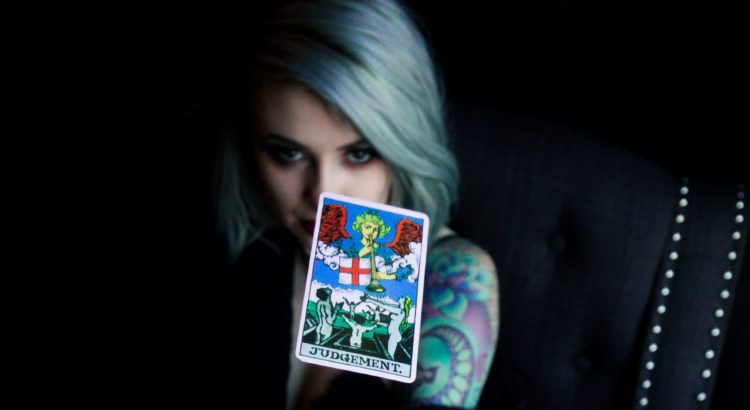Level B1 and above - Making predictions in English
“You will meet a tall, dark, handsome stranger,” a fortune teller told me four months ago. This was a prediction – it was not an intention, a plan, a pre-arranged event, or a decision. A guide to making predictions in English.
Written and compiled by Benedicte Gravrand, at The Language House
How to predict in English?
There are different ways of making predictions in English:
- Predictions based on evidence, or proof. We can see it coming. For example, “I see dark clouds in the sky; it is going to rain” Use “be going to” + infinitive.
Susan rang. She said she is going to be late.
If Barcelona wins this match, they are going to be the top team.
- Predictions based on knowledge or belief. For example, “she’ll be here in a couple of minutes,” or, “I will be rich one day.” Use “will” (or ‘ll) + infinitive verb (without “to”). It is also possible to use the continuous form: “You will be going on a long journey.”
In 1960 he told everyone: “Technology will rule the world.”
He will be here on time. He’s always punctual.
3. Future probability. For example, “we may find a vaccine this year, we may not.”
Use the model verbs “may” or “should” to express a possibility, or “might” or “could” to express weak probability (+ infinitive verb without “to”).
Subscribe now (details on the right-hand column). It will be good for your English.
Exercise:
Fill the gaps with “be going to” (conjugated), “will”. In some cases both answers are possible.
The first one has been done for you.
- Sarah is going to have another baby this summer. I have just seen her.
- I don’t know how, but I know things …… get better.
- I’m going to a party so I …… probably be home late tonight.
- I think they …… want to meet us before they decide.
- He drives too fast. He …… have an accident one of these days.
- I don’t feel well. I think I ……. sick.
- I think nobody …… never know what happened that day.
- “This time next year, you …… be travelling the world,” said the fortune teller.
- You …… never finish that book. It’s too difficult.
- I think Barcelona …… win. They have won their last seven matches.
- The economic climate is not good. Orders …… be difficult to get.
- It …… snow soon. We can feel it in the air.
- Their new house …… look over the river. That is what they have always wanted.
- I am seeing Jean tomorrow. I wonder if she …… recognise me.
- Nothing lasts forever. One day there … be no more oil.
- She’s very angry. She’s gone to see the boss. I think she …… resign.
- When …… you know his decision?
- There is no competition for this product. I am sure, it …… be a great success.
Answer key:
1: is going to
2: will
3: will
4: will
5: is going to
6: am going to
7: will
8: will
9: will / are never going to finish the book
10: is going to / will
11: are going to
12: is going to
13: is going to – or will
14: will
15: will
16: is going to
17: will
18: is going to / will
Sources: Practical English Usage, Michael Swan. Market leader, Peter Strutt
Reading
(level B2-C2)
Will somebody please tell me what the future holds?
I am anxious about my future and my family’s future. Who isn’t? I need some certainty in my life, something to hold on to.
So, I decided to consult some experts on the future: a futurist, an economist and an astrologer.
The futurist

“How do you predict the future? How should I prepare?” I ask the futurist. We are on a conference call and from what I see on my computer screen, he is a thin, greying man with intelligent black eyes. I know he is an important academic who advises governments and institutions on future risks and opportunities. He also, in his spare time, writes science fiction.
“Well,” he says, “I predict all possible futures by studying historical data and current trends. I look at the three Ps and a W: Possible, Probable, and Preferable futures – and Wildcards, that is, low-probability high-impact events. As you can guess, the current pandemic is a wildcard, aka (also known as) a ‘black swan’ event. I have been predicting a possible pandemic for several years now, and I have been stocking food and water in my garage and cash under my mattress. Ironically, I can’t use the cash now, and there’s still plenty of food and water supplies in the shops.
“Predicting the future from a black swan event is the hardest,” he continues. “I cannot tell you how to prepare for the future because right now anything is possible. We may find a vaccine this year, or next year. We may build immunity, we may not.
“Of course, there is a strong probability of increased global collaboration, more people working from home, less international travel, and a greater use of technology… for everything. However, if we may also come back to the lifestyle we had before 2020.
“Don’t think about the future,” he concludes with a smile. “Think about now. Take it one day at a time. Focus on what you can do, not on what you cannot do.” He is himself focusing on redecorating his house, he adds.
It looks like the futurist has become a stoic philosopher. I thank him and switch off the Zoom call. I have not learnt much from this conversation for I already suspected I might have to work from home and travel less in the near future – and maybe also in the far future. And when we’ll find an acceptable vaccine is anyone’s guess. As for what I can do for the future… is use a bicycle, instead of a car (too polluting) or public transports (great for transmitting viruses).
So far, I am not closer to having any certainty about the future.
The economist

Now I do understand that economists are not exactly known for their precise forecasts (a forecasts is statement about what is likely to happen based on available information). They get it wrong more often than not. But a few had predicted the great financial crisis of 2008, for example, and 1929, and 2001… So maybe economists can help me, even a little.
I am going to talk to one who does not have strong convictions but, instead, a balanced view. She is a middle-aged American with impeccable hair and gold-rimmed eye-glasses, and she is often interviewed on financial TV channels.
“Could you share with me the possible economic futures that you see. I need to know more about my home and my job,” I tell her over a Skype call.
“Well,” she says, “the world economy could shrink from as little as -0.7% to as much as -7% this year. It could be anything from a minor inconvenience to an economic ice age.”
“What are the recovery scenarios?” I ask.
“The best one is an economic fall followed by a strong recovery, with the help and fiscal and monetary stimuli around the world. This is what we all a V-shaped recovery.
“Then there is the U-shaped recovery, like in 2008-09, where economies will take some time to recover, this time because social distancing will affect many industries.
“And there is the W-shaped recovery, where the economies will restart immediately after the end of the lockdowns, but high levels of unemployment and corporate bankruptcies – or a new wave of the pandemic – will eventually bring the economy down again.
“Finally, the L-shaped recovery is a scenario where the global economy does not recover, or takes a very long time to recover, maybe because there isn’t enough stimulus or the virus does not go away.
“Europe, where you are based, has a good chance of some kind of recovery, as there are many programs in place. But I can’t tell you if you should sell your home or if you’ll have a job next month. There are so many variables. All essential jobs – food production and supplies, security and police, medical professions, truck drivers, teachers, utility workers (power, water, phone and internet services, waste disposal…) are in general recession proof. Engineers, firefighters and morticians may do well too.
“As for real estate,” she adds. “It’s anyone’s guess. Some people will not sell their home because real estate has lost value, some people will sell their home because they have lost their job…” She adds she feels lucky because she has a lot of savings, no debt, and a house that is all hers.
I thank her for her broad perspective and switch off the call. I am now sitting in front of a blank computer screen, and a blank economic forecast. I still don’t have any certainty about my economic future.
The astrologer

The astrologer I have been recommended looks like an artist, with long curly hair, a flowery dress, big shiny eyes and a wide smile. I am told that while astrology is not a science, it is an deep study of the movements of the planets in the solar system and their synchronicity with events on earth.
Some astrologers predicted that in February and March 2020, when Mars joins Jupiter, Saturn and Pluto in Capricorn, this could result in something big in the world. But most did not predict the pandemic.
“What can you see in my future?” I ask her.
“The conjunction of Jupiter, Saturn and Pluto in Capricorn will trine your moon in Taurus and it will be rather easy for you. But at the same time, as Uranus is in Taurus and conjunct your moon, it could be very hard.”
“Sorry?”
“It means,” she says with an even bigger smile, “that 2020 will be both an opportunity and a challenge for you. How you come out on the other side of the crisis depends entirely on your attitude and your actions.” Keep calm and carry on, she concludes.
I am happy she is paid by the minute, because she told me everything I needed to know in a very short time. I switch off FaceTime after thanking her. Again, I have a confirmation of what I already suspected. I am privileged in that I can survive during a lockdown, but not enough to guarantee that the rest of the year will be plain sailing.
I am not sure anyone can tell me what the future holds. I need it, but I am not going to get it. Maybe I should focus on something else. Maybe I’ll study history.
Main sources: Wikipedia Quartz ABC News WEF Urban Survival Jessica Adams
Check your vocabulary
- real estate
- boost
- hold on to
- spare time
- data
- trend
- a gradual change or development that produces a particular result
- to hold something tightly or carefully so that you do not drop it or do not fall
- facts or information used for making calculations or decisions: can be followed by a plural verb in scientific English, in which case the singular is datum
- land and the buildings on it
- to help something to increase, improve, or become more successful
- time when you do not have to work or study and when you can do what you like
__________
Answer key:
1:d – 2:e – 3:b – 4:f – 5:c – 6:a
__________
- event
- Take it one day at a time
- Switch off
- be anyone’s guess
- shrink (v.)
- ice age
- if you switch off something such as a light or a machine, or if it switches off, it stops working
- a period of time thousands of years ago when large areas of the Earth were covered in ice
- used for saying that something is not known by anyone
- to become smaller in size
- To deal with some unpleasant, difficult, or undesirable situation gradually, without focusing too much on its eventual outcome.
- something that happens, especially something that involves several people
__________
Answer key:
7:l – 8:k – 9:g – 10:i – 11:j – 12:h
__________
- recovery
- unemployment
- bankrupt
- synchronicity
- recession proof
- lockdown
- plain sailing
- a time when large numbers of people are ordered to stay at home either most or all of the time
- a situation in which two or more things happen at the same time and seem to be connected even if they are not
- a term used to describe an asset, company, industry or other entity that is believed to be economically resistant to the effects of a recession
- something easy to do or achieve
- (in this context) the process of returning to normal activity after a period of slow activity
- a person or business that is bankrupt has officially admitted that they have no money and cannot pay what they owe
- a situation in which some people do not have work and do not have an income
__________
Answer key:
13:q – 14:s – 15:r – 16:n – 17:o – 18:m – 19:p
__________
Definitions from MacmillanDictionary.com
Writing
How do you think the coronavirus will affect the future? Is it a game changer? Or will life go back to “normal”?
What are your predictions?
Please leave your predictions in the commentaires section below. We’d love to hear from you.
Video
(Level: C1 – C2)
Superforecasting: How to Predict the Future (4 mins 40 secs)


